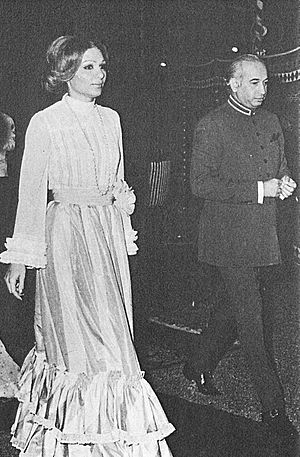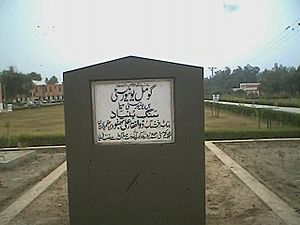Zulfikar Ali Bhutto facts for kids
Quick facts for kids
Shaheed
Zulfikar Ali Bhutto
|
|
|---|---|
| ذُوالفِقار علی بُھٹّو | |
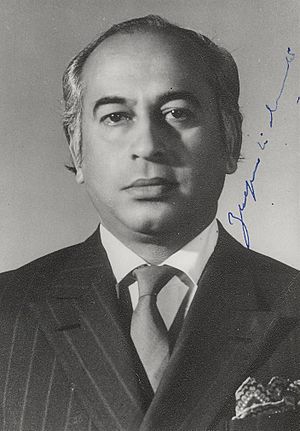
Bhutto c. 1971
|
|
| 4th President of Pakistan Chief Martial Law Administrator |
|
| In office 20 December 1971 – 13 August 1973 |
|
| Vice President | Nurul Amin (1971–72) None (1972–73) |
| Preceded by | Yahya Khan |
| Succeeded by | Fazal Ilahi Chaudhry |
| 9th Prime Minister of Pakistan | |
| In office 14 August 1973 – 5 July 1977 |
|
| President | Fazal Ilahi Chaudhry |
| Preceded by | Nurul Amin |
| Succeeded by | Muhammad Zia-ul-Haq (as Chief Martial Law Administrator) |
| 7th Speaker of the National Assembly | |
| In office 14 April 1972 – 15 August 1972 |
|
| Deputy | Muhammad Hanif Khan |
| Preceded by | Abdul Jabbar Khan |
| Succeeded by | Fazal Ilahi Chaudhry |
| 8th and 12th Minister of Foreign Affairs | |
| In office 15 June 1963 – 31 August 1966 |
|
| President | Ayub Khan |
| Preceded by | Muhammad Ali Bogra |
| Succeeded by | Sharifuddin Pirzada |
| In office 20 December 1971 – 28 March 1977 |
|
| President | Fazal Ilahi Chaudhry |
| Preceded by | Yahya Khan |
| Succeeded by | Aziz Ahmed |
| Personal details | |
| Born | January 5, 1928 Ratodero Taluka, Bombay Presidency, British India (present-day Ratodero Tehsil, Sindh, Pakistan) |
| Died | 4 April 1979 (aged 51) Rawalpindi, Punjab, Pakistan |
| Cause of death | Execution by hanging |
| Resting place | Bhutto family mausoleum |
| Nationality | British Indian (1928–1947) Pakistani (1947–1979) |
| Political party | Pakistan People's Party |
| Other political affiliations |
Convention Muslim League (before 1967) |
| Spouse | |
| Relations | See Bhutto family |
| Children | Benazir Bhutto Sanam Bhutto Murtaza Bhutto Shahnawaz Bhutto |
| Parents |
|
| Alma mater | University of California, Berkeley Christ Church, Oxford Lincoln’s Inn |
| Profession | Lawyer, politician |
| Nickname | Quaid-e-Awam ("the People's Leader") |
Zulfikar Ali Bhutto (Urdu: ذُوالفِقار علی بُھٹّو; 5 January 1928 – 4 April 1979) was an important Pakistani lawyer and politician. He served as the fourth President from 1971 to 1973. Later, he became the ninth Prime Minister of Pakistan from 1973 to 1977. His government created the Constitution of Pakistan in 1973, which is still used today.
Bhutto founded the Pakistan People's Party (PPP) and was its leader until his death. His daughter, Benazir Bhutto, later became the Prime Minister of Pakistan twice. His grandson, Bilawal Bhutto Zardari, is now the leader of the PPP and serves as the Foreign Minister of Pakistan.
Contents
Early Life and Education
Zulfikar Ali Bhutto was born into a Sindhi family near Larkana. His father, Sir Shah Nawaz Bhutto, was an important figure in the British Raj. As a young boy, Bhutto went to school in Bombay (now Mumbai), India. He also became involved in the movement to create Pakistan.
In 1947, Bhutto moved to the United States to study political science at the University of Southern California. In 1949, he transferred to the University of California, Berkeley, where he earned a degree in political science. While studying, he became interested in socialist ideas.
In 1951, he married Nusrat Ispahani, who became known as Begum Nusrat Bhutto. After his studies in the U.S., Bhutto went to the United Kingdom. He studied law at Christ Church, Oxford and became a lawyer at Lincoln's Inn in 1953.
Starting a Political Career
In 1957, Bhutto became the youngest member of Pakistan's team at the United Nations. He spoke about important global issues. The next year, he became Pakistan's youngest cabinet minister, in charge of trade.
He quickly became a trusted helper and advisor to President Ayub Khan. Bhutto helped Pakistan sign the Indus Water Treaty with India in 1960. He also worked on an oil exploration agreement with the Soviet Union.
Becoming Foreign Minister
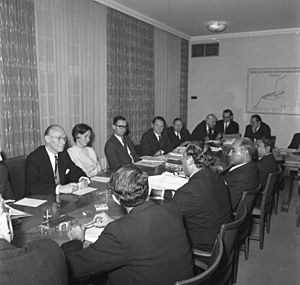
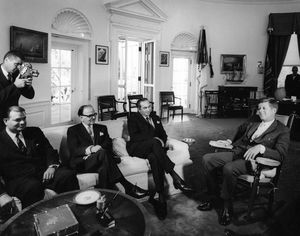
In 1963, Bhutto became the Foreign Minister. He believed in a strong, independent foreign policy for Pakistan. He worked to build a close relationship with China, even when many other countries did not recognize China's government.
Bhutto also supported Pakistan's role in the Non-Aligned Movement. This movement included countries that did not want to take sides in the Cold War between the United States and the Soviet Union. He also worked to improve relations with Muslim countries like Indonesia and Saudi Arabia.
In 1965, Pakistan and India fought a war over Kashmir. Bhutto was a strong supporter of military action in Kashmir. After the war, a peace treaty called the Tashkent Agreement was signed. Bhutto disagreed with this agreement and left the government in 1966.
Bhutto was also interested in Pakistan developing its own nuclear energy program. He believed it was important for Pakistan's safety and future.
Founding the Pakistan Peoples Party
After leaving the government, Bhutto traveled across Pakistan, giving speeches. He connected with many people who were unhappy with the government. On 30 November 1967, he founded the Pakistan Peoples Party (PPP). The party's main ideas were "Islam is our faith, democracy is our policy, socialism is our economy. All power to the people."
The PPP quickly gained support, especially in the regions of Punjab and Sindh. Bhutto and other PPP leaders were arrested in 1969, which only made more people support their cause.
The 1970 Elections and Bangladesh
In 1970, President Yahya Khan held elections. Bhutto's PPP won the most seats in West Pakistan. However, the Awami League, led by Sheikh Mujibur Rahman, won the most seats overall, mostly in East Pakistan. The two parties could not agree on how to share power or create a new constitution.
Many in West Pakistan, including Bhutto and President Yahya Khan, worried that the Awami League's demands would break up the country. The disagreement led to major unrest in East Pakistan. This eventually resulted in the Bangladesh Liberation War in 1971. Pakistan lost the war, and East Pakistan became the independent country of Bangladesh.
After this defeat, President Yahya Khan resigned. On 20 December 1971, Zulfikar Ali Bhutto became the new President of Pakistan. He was also the first civilian Chief Martial Law Administrator.
President of Pakistan
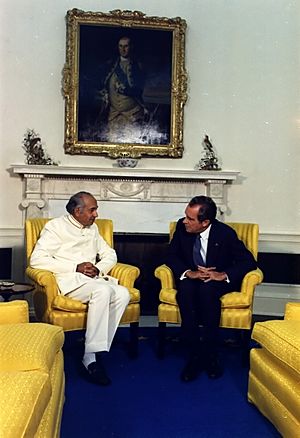
When Bhutto became president, Pakistan was in a difficult situation. The country had just lost a war and was divided. Bhutto's main goal was to "rebuild confidence and rebuild hope for the future."
He immediately put the former president, Yahya Khan, under house arrest. He also ordered the release of Sheikh Mujibur Rahman, who had been imprisoned. Bhutto began to make big changes. He nationalized, or took government control of, major industries like steel, chemicals, and cement. He also introduced new rules to protect workers' rights.
In 1972, Bhutto met with Indian Prime Minister Indira Gandhi and signed the Simla Agreement. This agreement helped bring 93,000 Pakistani prisoners of war back home. It also returned about 5,000 square miles of land that India had taken during the war. The agreement committed both countries to solve their problems peacefully.
Bhutto also played a key role in starting Pakistan's nuclear energy program. He believed it was essential for Pakistan's defense and future.
In 1973, the parliament approved a new constitution. This constitution made Pakistan an "Islamic Republic" with a parliamentary government. On 10 August 1973, Bhutto became the Prime Minister, and Fazal Ilahi Chaudhry became the President.
Pakistan's Nuclear Program
Zulfikar Ali Bhutto is often called the "Father of Pakistan's Nuclear Deterrence Program." His interest in nuclear technology began when he was a student. He believed Pakistan needed to develop its own nuclear capabilities for energy and defense.
In 1958, as a minister, Bhutto helped set up the Pakistan Atomic Energy Commission (PAEC). He made sure the program received the necessary funds and support. After India conducted a nuclear test in 1974, Bhutto became even more determined. He saw this as a serious threat to Pakistan.
Under Bhutto's leadership, the PAEC began working on developing nuclear technology for peaceful purposes and for defense. He brought in talented scientists and engineers to lead this important national effort. The goal was to ensure Pakistan's safety and independence in a changing world.
Economic and Social Changes
As Prime Minister, Bhutto made many changes to Pakistan's economy and society. He continued his policy of nationalizing industries, including banks, flour mills, rice mills, and cotton mills. The idea was to reduce inequality and give more control to the government.
He also focused on education. His government built thousands of new schools, from elementary to universities. He established important institutions like Quaid-e-Azam University and Allama Iqbal Open University. He also made Islamic studies and Pakistan studies compulsory subjects in schools.
Bhutto introduced land reforms to help small farmers. He set limits on how much land a person could own and gave more rights to tenant farmers. In Balochistan, he worked to abolish the old feudal system, which gave too much power to landlords.
His government also focused on improving workers' rights. They set up labor courts to handle workers' complaints and introduced schemes for workers to participate in management decisions. They also created a pension scheme to provide benefits to workers after retirement.
Foreign Policy and Global Ties
Bhutto wanted Pakistan to have an independent foreign policy, not relying too much on any single country. He withdrew Pakistan from military alliances like CENTO and SEATO.
He worked to strengthen ties with the Arab world and China. In 1974, he hosted the second Organisation of the Islamic Conference (OIC) in Lahore, bringing together leaders from Muslim countries. He believed in unity among Afro-Asian and Islamic nations.
Bhutto also tried to improve relations with Afghanistan. He aimed to resolve border issues and promote peace in the region.
Challenges and End of Term
As his time as Prime Minister continued, Bhutto faced growing criticism. There were political disagreements and protests against his government. Some of his own party members left due to differences in opinion.
In 1977, a group of opposition parties formed the Pakistan National Alliance (PNA). They accused Bhutto's government of rigging the elections. This led to widespread protests and violence across the country.
On 5 July 1977, General Muhammad Zia-ul-Haq, the army chief appointed by Bhutto, led a military coup. Bhutto and his cabinet members were arrested. General Zia-ul-Haq promised new elections within 90 days, but these were repeatedly postponed.
Bhutto was later arrested again on charges related to the murder of a political opponent's father. He was tried by the High Court of Lahore. The trial lasted five months. On 18 March 1978, Bhutto was found guilty and sentenced to death.
His family appealed the decision to the Supreme Court of Pakistan. Many world leaders also asked for his sentence to be changed. However, on 6 February 1979, the Supreme Court upheld the guilty verdict. Zulfikar Ali Bhutto was hanged on 4 April 1979, and buried in his family mausoleum in Garhi Khuda Baksh.
Personal Life
Zulfikar Ali Bhutto married Shireen Amir Begum in 1943, but they later separated. On 8 September 1951, he married Nusrat Ispahani. They had four children: Benazir Bhutto, Murtaza, Sanam, and Shahnawaz.
Legacy
Zulfikar Ali Bhutto remains a very important and discussed figure in Pakistan's history. He is remembered for his strong nationalism and his efforts to make Pakistan a respected country on the world stage.
He is widely praised for giving Pakistan its 1973 constitution and for starting the country's nuclear program. Many see him as one of Pakistan's greatest civilian leaders. His supporters call him Quaid-e-Awam, which means "Leader of the People."
His family has continued to be active in politics. His daughter, Benazir Bhutto, became Prime Minister twice. His son, Murtaza Bhutto, also served as a Member of Parliament.
Images for kids
Books by Zulfikar Ali Bhutto
- Peace-Keeping by the United Nations, 1967
- Political Situation in Pakistan, 1968
- The Myth of Independence, 1969
- The Great Tragedy, 1971
- Marching Towards Democracy, 1972
- Politics of the People, 1948–1971
- The Third World: New Directions, 1977
- My Pakistan, 1979
- My Execution, 1980
- New Directions, 1980
See also
 In Spanish: Zulfikar Ali Bhutto para niños
In Spanish: Zulfikar Ali Bhutto para niños
- Ghinwa Bhutto
- Jumo Faqir
- Nusrat Bhutto
- List of presidents of Pakistan
- List of prime ministers of Pakistan
- Movement for the Restoration of Democracy
 | Sharif Bey |
 | Hale Woodruff |
 | Richmond Barthé |
 | Purvis Young |


